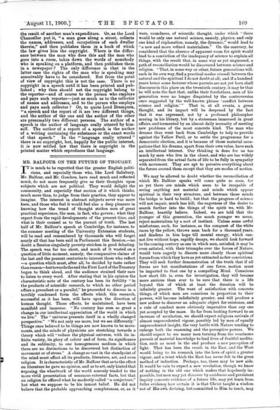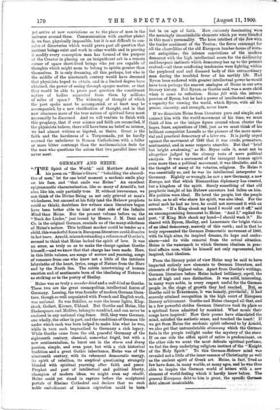MR. BALFOUR ON THE FUTURE OF THOUGHT.
IT is much to be regretted that the greater English politi- cians, and especially those who, like Lord Salisbury, Mr. Balfour, and Mr. Goschen, have read much and reflected much, do not more frequently give us their thoughts upon subjects which are not political. They would delight the community, and especially that section of it which thinks, much more than, to judge from their practice, they appear to imagine. The interest in abstract subjects never was more keen, and those who feel it would feel also a deep pleasure in knowing how the trend of thought strikes men of great practical experience, the men, in fact, who govern; what they expect from the rapid developments of the present time, and what is their counsel as to the pursuit of truth. The last half of Mr. Balfour's speech at Cambridge, for instance, to the summer meeting of the University Extension students, will be read and remembered by thousands who will forget nearly all that has been said in Parliament this Session,—no doubt a Session singularly poverty-stricken in good debating. The speech was far too short, and much of it wasted on a question of little moment, namely, the comparative claims of the last and the present centuries to interest those who reflect —a question which must, after all; be decided by taste rather than reason—but towards the end the First Lord of the Treasury began to think aloud, and the audience strained their ears to listen to every word. After stating that in his opinion the characteristic note of the century has been its fertility "in the products of scientific research, to which no other period offers a precedent or a parallel," he proceeded to discuss in a terribly condensed form the effects which this research, successful as it has been, will have upon the direction of human thought. Those effects, he maintained, have been manifold and immense. "No century has seen so great a change in our intellectual appreciation of the world in which we live." The "universe presents itself in a wholly changed perspective." "We not only see more, but we see differently." Things once believed to be things are now known to be move- ments, and the minds of physicists are stretching towards a theory which will" reduce the physical universe, with its in- finite variety, its glory of colour and of form, its significance and its sublimity, to one homogeneous medium in which there are no distinctions to be discovered but distinction of movement or of stress." A change so vast in the standpoint of the ruind must affect all its products, literature, art, and even religion. It is characteristic of Mr. Balfour that as to the effect on literature he gave no opinion, and as to art, only hinted that exposing the wheelwork of the world scarcely tended to the more vivid presentation of sensuous external facts, but that on religion he offered what he modestly called " a conjecture," but what we suppose to be his inmost belief. He did not believe that the probable approaching completeness, or, as it were, roundness, of scientific thought, under which there would be only one natural science, namely, physics, and only one kind of explanation, namely, the dynamic," would lead to "a new and more refined materialism." On the contrary, he considered that the absence of apparent room for spirit would lead to a conviction of the inadequacy of science to explain all things, with the result that, in some way as yet unguessed, a path of reconciliation would be discovered between science and religion. "That, in some way or other, future generations will, each in its own way, find a practical malts vivendi between the natural and the spiritual I do not doubt at all; and if a hundred years hence some lecturer whose parents are not yet born shall discourse in this place on the twentieth century, it may be that he will note the fact that, unlike their forefathers, men of his generation were no longer disquieted by the controversies once suggested by the well-known phrase conflict between science and religion.'" That is, at all events, a great thought, and its impact will be deepened by the fact that it was expressed, not by a professed philosopher musing in his library, but by a statesman immersed in great affairs, and tormented by an almost daily necessity of meeting new problems of the most concrete kind. The man who dreams thus went back from Cambridge to help to provide against the Yellow Peril, or to settle the programme for a democratic election, and it is because of those material occu- pations that his dreams, apart from their own value, have such an intellectual interest. Our thinking is done for us too much by men who live in the closet, and who are too widely separated from the actual facts of life to be fully in sympathy with movement. They are apt to perceive everything about the forces around them except that they are modes of motion.
We may be allowed to doubt whether the reconciliation of which Mr. Balfour speaks will come quite so soon, for as yet there are minds which seem to be incapable of seeing anything not material and minds which appear spiritual in their very structure, and between those minds the bridge is hard to build ; but that the progress of science will not impair, much less kill, the eagerness of the desire to search further into the things of the spirit we, with Mr. Balfour, heartily believe. Indeed, we are told that the younger of this generation, the much younger we mean, reject materialism by a sort of instinct. Unless some awful misfortune, such, for instance, as the conquest of the white races by the yellow, throws man back for a thousand years, and deadens in him hope till mental energy, which can- not live without hope, rapidly decays, we should look forward to the coming century as one in which men, satisfied, it may be even satiated, with their triumphs over the forces of Nature, would turn eagerly to discern more clearly those spiritual forces from which they have as yet extracted so few convictions. They will seek further demonstration of the truth that if all forces are but manifestations of one force, motion must be imparted to that one by a compelling Mind. Conscious how short life is, even for investigation, they will become more anxious than ever to be sure that there is a life beyond this of which at least the duration will be infinitely greater. The want of satisfaction with concrete things, of which men are conscious in proportion to their powers, will become indefinitely greater, and will produce a new ardour to discover an adequate object for existence, and a rule of conduct more obviously imperative than any one yet accepted by the mass. So far from looking forward to an increase of secularism, we should expect religious revivals of almost unprecedented vigour, possibly led by men of equally unprecedented insight, the very battle with Nature tending to enlarge both the reasoning and the perceptive powers. We should expect to see many men turning from the wearisome pursuit of material knowledge to lead lives of fruitful medita- tion, such as must in the end produce a new perception of light. That has been the result in the East, and the West would bring to its research into the laws of spirit a greater vigour, and a trust which the East has never felt in the great method of induction. Perhaps, too, there may be new aids. It would be vain to expect a new revelation, though we know of nothing in the old one which makes that hopelessly im- possible, but men may yet discover by assiduous and persistent inquiry concrete evidence of a future life, may yet learn from fuller evidence how certain it is that Christ taught a wisdom not of His own devising, but committed to Him to teach, may
yet arrive at new convictions as to the place of men in the universe around them. Communication with another planet is. we fear, physically impossible, but it is not difficult to con- ceive of discoveries which would prove past all question that sentient beings exist and work in other worlds, and in proving it modify every conception man has formed of the purpose of the Creator in placing on an insignificant orb in a remote corner of space short-lived beings who yet are capable of thoughts which might seem to belong to spirits greater than themselves. It is only dreaming, all this, perhaps, but who in the middle of the nineteenth century would have dreamed that physicists hoped to obtain, and in a limited degree have obtained, the power of seeing through opaque matter, or that they would be able to prove past question the constituent nature of bodies separated from them by millions of miles of space ? The widening of thought of which the poet spoke must be accompanied, or at least may be accompanied, by a new clarification of thought, and in that new clearness more of the true nature of spiritual force must necessarily be discerned. And we will venture to finish with this prophecy, that if ever science and faith are reconciled, if the physicists believe, there will have been no belief so intense, we had almost written so bigoted, as theirs. Great is the faith and the harshness of a Torquemada, yet he hardly scorned the unbeliever in Roman Catholicism with a fuller or more bitter contempt than the mathematician feels for the man who questions the axiom that two parallel lines will never meet.



































 Previous page
Previous page